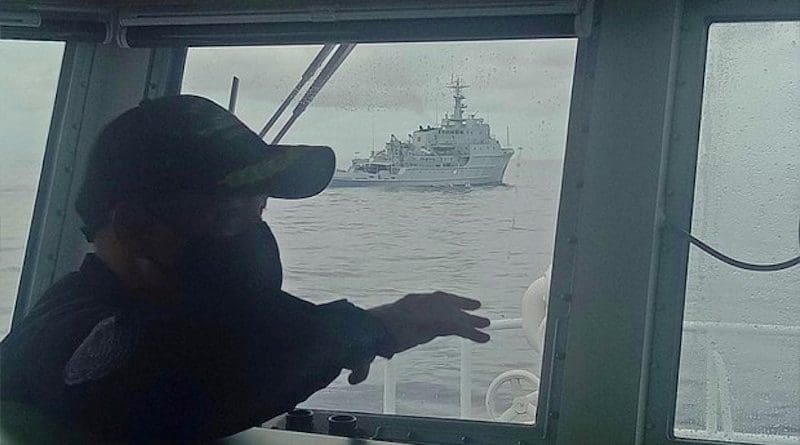AUKUS And Duty To Cooperate: Current State And Future Direction Of South China Sea Disputes – Analysis
The trilateral arrangement of Australia, United Kingdom and the United States or AUKUS is adding to the complexity of the South China Sea (SCS) disputes. If not effectively managed through open dialogues, consultations, and negotiations, the AUKUS can unnecessarily heighten major power competition and inevitably disrupt planned cooperation in the SCS.
There are three major factors affecting the current state and future direction of the SCS dispute.
The first factor is unilateralism. Unilateral actions (not only military and paramilitary activities but as well as economic and development activities) of claimants and other stakeholders in the SCS are heightening security tensions. If not regulated through common understanding and mutual respects, unilateralism can aggravate actions- and-reactions dynamics that can fuel more suspicions and can raise the risks of miscalculation and error in judgment that can lead to violent accidents and worst, unintended armed confrontations in SCS. Growing unilateralism is counter-productive for peacebuilding in the SCS. Increased unilateralism can also encourage rather than prevent armed conflicts in this highly contested maritime domain.
But there is an antidote to unilateralism, which is cooperation that can be pursued through bilateral or multilateral approaches. The Bilateral Consultative Mechanism (BCM) in the SCS between the Philippines and China is an excellent example of bilateral method to uphold cooperation in the SCS through consultation. The on going discussion on the Code of Conduct (COC) in the SCS between China and the Association of Southeast Asian Nations (ASEAN) is an excellent example of multilateral method to prevent armed conflicts and pursue regional cooperation in the SCS through negotiation. There is a strong need to sustain these bilateral and multilateral approaches in order to constantly champion confidence building and preventive diplomacy in the SCS.
The second factor is popular nationalism, which also encourages unilateralism and assertiveness of states involved in the SCS disputes. Though nationalism is important to guard each other’s sovereignty, rights and national interests in the SCS, it must be pursued reasonably in order to be cognizant and protective of regional and global interests. The SCS is not only an issue of national interest that should be pursued selfishly, ethnocentrically, and egoistically by states. The SCS is also an issue of regional security and world peace.
Thus, popular nationalism must be balanced and moderated by regionalism and internationalism through the advancement not only of individual national interests but through the pursuance of shared national interests, common regional interests, and converging international interests. To use the words of Chinese President Xi Jingping, we need to build “a community of shared future for mankind” and this applies to the SCS. We can share the resources of the SCS through joint development, regional maritime cooperation, and global ocean governance.
Finally, the third factor is the involvement of extra-regional powers. Military actions of major powers in the SCS (like the AUKUS and even some provocative Freedom of Navigation Operations or FONOPS) are worsening security anxieties of states. They also heighten major power competitions, particularly with China, that exacerbate the security predicaments of smaller states. Because of AUKUS and some provocative FONOPs, the SCS is becoming a playground of major power competitions that put smaller states like the Philippines in a difficult and problematic situation.
To peacefully manage conflicts in the SCS, it is imperative for major powers to increase their involvements in bilateral and multilateral dialogues and consultations that aim to promote cooperation rather than military competition, specifically in the areas already identified in the DOC and being negotiated in the COC. These areas are marine environmental research, marine environmental protection, safety of navigation and communication at sea, search and rescue operations, and combating transnational crimes including international terrorism. Rather than divide claimants and littoral states in the SCS through provocative military activities, major powers like the AUKUS can instead unite all players and stakeholders though productive non-military initiatives like supporting efforts to build regional maritime economy and infrastructure connectivity.
Though the Philippines is considered a friend of AUKUS by being the oldest Asian military ally of the United States, a close security partner of Australia, and strategic distant friend of the United Kingdom, Manila continues to value its centuries old friendship with China. The Philippines and China are currently pursuing comprehensive strategic cooperation in various areas including the SCS. AUKUS and other major powers can support rather than disrupt this effort by building a new model of relationship with China that upholds the principle of duty to cooperate in the SCS.
The duty cooperate is not only a moral obligation but also political requirement mandated by international laws, particularly the United Nations Convention on the Law of the Seas (UNCLOS). The duty to cooperate and not military competition should define the current state and future direction of the SCS disputes.
*The author is the President of the Philippine Association for Chinese Studies (PACS) and a member of the Board of Directors of the China-Southeast Asia Research Center on the South China Sea (CSARC). He is a Professorial Lecturer at the Department of International Studies, Miriam College, the Philippines and an Adjunct Professor at the National Institute for South China Sea Studies (NISCSS).
This piece was originally presented at the “Virtual Book Talk on Security, Strategy and Military Dynamics in the South China: Cross National Perspectives” organized by the China Institute of the University of Alberta, Canada and Institute for China American Studies (ICAS), Washington DC on 28 September 2021.

